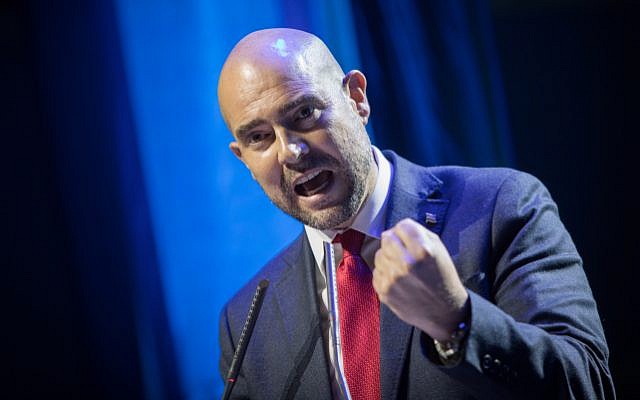In maiden speech, Amir Ohana vows to pursue reform, though his ability to follow through in his interim capacity is doubtful
By TOI STAFF 10 June 2019,

Likud MK Amir Ohana delivers his first speech as justice minister at a conference of the Israel Bar Association, in Jerusalem, on June 10, 2019. (Noam Revkin Fenton/Flash90)
Newly appointed Justice Minister Amir Ohana on Monday called Israel’s justice system “the least democratic” of the country’s three branches of government, and vowed to seek changes he believed would lead to a more balanced judiciary — though his power to enact such reforms is doubtful.
In a speech at an event of the Israel Bar Association, his first since taking office last week, Ohana said, “Anyone who wants a strong justice system, anyone who wants what is best for the justice system — must be prepared to criticize it, and criticism also means change.”
“Can it truly be claimed that the way judges are appointed allows the necessary pluralism?” he said. “Can we ignore the public’s sense of a growing rift between the terms ‘law’ and ‘justice’?
“I see only one branch [of government] that has no checks and balances, barring those it is good enough to place upon itself.”
He asserted that the justice system “is the least democratic of the three branches [of government]. Those who sit are not accountable for their decisions, and do not come to the public once every four years to ask and receive — or not receive — its trust.”
But he said the needed corrections would not be possible “so long as we surrender to the tired cries of ‘an end to democracy’ and ‘the collapse of the rule of law’ regarding any change to the status quo.”
He said that under his stewardship, “there will be conflicts, there will be differences of opinion, we will manage them with equanimity, in a level-headed and cordial manner. But we will mend what needs mending.”
But while Ohana appeared intent on setting the tone for his term — and possibly that of his Likud party if it retains the portfolio — it was unlikely that he would be able to enact any far-reaching policy changes himself. Prime Minister Benjamin Netanyahu only appointed him to the job as a placeholder, after firing the New Right’s Ayelet Shaked last week.
With new elections in September and the Justice portfolio one of the most coveted in coalition negotiations, Ohana is unlikely to survive in the post for more than a few months. and hardly has the mandate or the means to make sweeping changes while serving in an interim government.
Shaked formally departed from the Justice Ministry last Tuesday, two days after she was fired by Netanyahu in a cabinet reshuffle that also targeted her political ally education minister Naftali Bennett. The move was widely seen as a bid to prevent the once-popular right-wing duo from using their cabinet positions to bolster their campaigns ahead of the new national vote.
Ohana is a lawyer by training who became the first openly gay MK in a right-wing party when he was elected to the Knesset in 2015. He is now the first openly gay minister in Israel’s history.
Ohana is among the only senior members of Likud to have publicly backed Netanyahu’s drive to secure immunity from prosecution in the cases against him. Earlier this year, he struck out at legal authorities over the Netanyahu investigations, charging that judicial officials, who have announced their intention to charge the prime minister pending a hearing, were usurping the will of the Israeli voters.
“This is what happens when bureaucrats who are not chosen by the public and don’t have to ask for its trust once every four years decide to take for themselves the reins of the state,” he was quoted as saying by the Ynet news site.
Netanyahu is suspected of corruption — including one count of bribery — in three cases, one of which involves gifts from wealthy associates, with the other two involving potential quid pro quo deals for regulatory favors in exchange for positive media coverage.
The prime minister has long accused police, the media, judicial officials and the political left of conducting a witch hunt against him, and has denied any wrongdoing.
Following Shaked’s dismissal, the position of justice minister reverted to Netanyahu, who, as well as prime minister, already holds the defense and health portfolios.
Initially, the Prime Minister’s Office said Netanyahu would temporarily assume the mantles of education and justice minister, but that sparked a backlash, with critics saying he could not hold the latter portfolio with an indictment hanging over his head. His office then backtracked and announced that interim ministers would be named within 48 hours.
Bezalel Smotrich of the Union of Right-Wing Parties last Monday called on Netanyahu to appoint him as Shaked’s replacement, later saying he wanted to impose Jewish religious law on the country. In response, Likud sources were quoted as saying there was no chance Smotrich would get the position after his comments, which Netanyahu also criticized in a Facebook post.
Likud’s Yariv Levin, currently minister of tourism as well as immigration and absorption, has long been angling for the Justice Ministry, but last Sunday he said he had no interest in serving there in an interim capacity ahead of the elections, paving the way for Ohana’s appointment.



Leave a Reply
You must be logged in to post a comment.